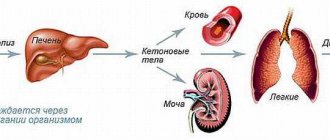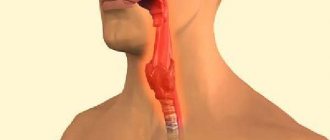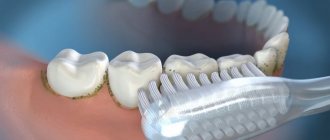Bad breath is a common problem that affects approximately one in three people. There is a medical term for bad breath - halitosis.
The appearance of an unpleasant odor may be a signal of health problems. In 90% of cases, halitosis is a consequence of poor hygiene or oral infections. Bad breath causes anxiety and embarrassment and makes it difficult to communicate with others, but it can be eliminated if the cause of its occurrence is identified and eliminated.
Causes of bad breath
The main cause of bad breath is the excessive proliferation of pathogenic bacteria in the oral cavity, which during their life processes release volatile gases with a characteristic unpleasant odor: hydrogen sulfide and methyl mercaptan. Plaque on the tongue, pieces of food stuck between teeth or in gum pockets are a consequence of poor hygiene and a breeding ground for microorganisms that spread a foul odor. In most cases, treatment by a dentist helps get rid of halitosis. Other causes of bad breath include:
- food with a persistent pungent odor (garlic, onions, some spices). During the digestion of garlic, volatile sulfur compounds are formed, which enter the blood and are carried throughout the body, ending up in the lungs, larynx and mouth. They become the cause of unpleasant “garlic breath”, which disappears completely only after 72 hours;
- smoking. Tobacco smoke itself has a persistent foul odor; in addition, it can provoke gum disease, which is a common cause of halitosis;
- dry mouth. Saliva is necessary for natural cleansing of the oral cavity. It washes away food particles, preventing them from rotting, and contains antimicrobial substances that inhibit the growth of pathogenic microflora. With xerostomia (a pathological condition characterized by decreased secretion or absence of saliva), the number of bacteria in the mouth increases significantly, which contributes to the development of caries and halitosis. Xerostomia can be caused by taking certain medications (hypotensives, chemotherapy, antiparkinsonian, etc.), as well as uncontrolled diabetes mellitus. Saliva production also naturally decreases during sleep. This leads to an increase in the number of bacteria in the mouth (mainly on the surface and back of the tongue) and the appearance of stale breath in the morning. Drinking alcoholic beverages, coffee and smoking are other causes of bad breath due to dry oral mucosa;
- diseases of the throat and nasopharynx. Bad breath can be caused by purulent plugs in the tonsils due to tonsillitis, bacterial or viral infections of the paranasal sinuses (sinusitis), chronic bronchitis and other diseases of the upper or lower respiratory system;
- diseases of the digestive system (gastritis, reflux), liver, kidneys, diabetes;
- fasting and low carbohydrate diets. They lead to the fact that the body, experiencing a lack of energy obtained from food, begins to burn accumulated fat reserves. When fats are broken down, ketone bodies are formed. These are by-products of fat metabolism, which are excreted from the body by the lungs and have an acetone odor.
Reasons for a strong odor from a person?
Interesting fact: Did you know that of all earthly creatures the only creatures that do not sweat are dogs, cats, piglets, and birds. They do not have sweat glands, and thermoregulation occurs through the respiratory system. Therefore, when dogs actively breathe after a summer walk, this helps to cool down.
This does not happen in humans; sweating is a natural and vital process for us. But many people are not satisfied with their body odor; girls especially suffer from this. After all, wet, yellow stains on clothes, an unpleasant aroma mixed with perfume, drive you into complexes and spoil your mood. But not everyone wants to get rid of the causes and symptoms of unhealthy odor by changing their lifestyle.
What could be the reasons for the appearance of a harsh spirit?
- Poor nutrition. It is not for nothing that it comes first, because this is the main and most common problem. Spicy, rich seasonings; fast food on a regular basis; fat meat; chocolate in large quantities - have the effect of enhancing heat transfer. The body begins to work more actively to digest the food received, which means that all other processes are launched. Sweating takes on a more pungent and sour odor.
- Bad habits. Alcohol, cigarettes, and drugs affect increased sweating. Thermoregulation is disrupted, toxins accumulate in the body, and as a result, bad body odor.
- Synthetic clothing. If it seems that you are starting to smell “not so good”, then reconsider your wardrobe. Clothing with low breathability prevents moisture from completely evaporating. The body sinks under the material, and the process of sweating is inhibited.
- Personal hygiene. It is important to take care of yourself, since the presence of hair on the genitals and in the armpit area does not allow sweat to fully evaporate and retains an unpleasant odor.
- Lack of sports. If you don’t exercise or are overweight, your body won’t thank you. Minimal physical strain will be accompanied by profuse sweating. Because the body will take the opportunity to expel toxins from itself as long as the person is doing something.
- Diseases. “In American clinics, the method of diagnosing diagnoses using dogs is becoming very popular. Dog handlers say that by the smell of sweat, a dog can detect whether a person is sick with something or not. Upon sensing an unfavorable odor from the patient, the dog sits up and barks.” Diseases and symptoms provoke the body to release toxins more actively for a faster recovery. An unhealthy odor from people indicates decay within the body. Therefore, do not delay treatment until later if your body aroma has changed significantly.
What causes sour breath?
The most common cause of sour breath is acid reflux. This is a pathology of the gastrointestinal tract, accompanied by heartburn, pain in the lower abdomen, and less commonly, belching. Symptoms of acid reflux occurring more than twice a week are already characterized as gastroesophageal reflux disease (GERD) and must be treated. The main cause of reflux is a weakening of the lower esophageal sphincter, a valve-like muscle that forms a barrier between the esophagus and the stomach. Normally, the sphincter opens when swallowing food and then closes tightly. With reflux, it remains open, allowing gastric juice mixed with bile and pieces of undigested food to flow back into the esophagus. This causes heartburn, a bitter or sour taste in the mouth, and bad breath that gets worse with belching.
In some cases, a person with GERD may feel their own bad breath without even opening their mouth. The sharp sulfuric acid smell of bile from the esophagus can even be heard through the nose. Less commonly, sour breath can be a symptom of peptic ulcer of the stomach and duodenum, accompanied by increased acidity of gastric juice.
Causes of unpleasant odor
The source of halitosis can be not only dental problems, but also diseases of internal organs.
In general, all the causes of the unpleasant smell of rotten breath can be divided into 2 large groups:
- physiological stem from poor diet and terrible oral hygiene;
- Pathological causes are influenced by more serious problems with internal organs and dental diseases.
| Reason for the smell | Main features | Associated symptoms |
| Disorders in the gastrointestinal tract | With increased acidity in the stomach, ulcers and gastritis, sour breath occurs. Dysbacteriosis and intestinal obstruction – heavy aroma of feces. In case of low acidity or poisoning - hydrogen sulfide. | The most common symptoms are nausea and vomiting. There is a constant bitterness in the mouth. Constipation, diarrhea and stomach pain are characteristic of gastrointestinal diseases |
| Respiratory diseases | Smells like rot and pus | Severe shortness of breath, sometimes turning into suffocation, cough: dry or wet depending on the illness, coughing up blood |
| Severe caries in an advanced stage | Rotten smell of rotten meat | Acute but short-term pain with shooting, brown spots on the teeth |
| Presence of dentures in the mouth | Putrid aroma | A large number of bacteria accumulate on dentures |
| Diseases of the ENT system | The odor usually resembles that of pus, but depending on the disease, it may be stronger. | Immune system disorders, inflammation in damaged areas, high body temperature, discharge from the ears and nose, pain |
| Constant smoking | The aroma of rot and the specific aroma of tobacco | Dry mouth, gray skin |
| Disorders of the salivary glands | Fetid smell of rot | Dry mouth due to low saliva production, shooting pain in damaged saliva and swelling |
| Diabetes mellitus type 1 and 2 | Unpleasant smell of acetone and fruits | Constant fatigue, frequent urination, constant hunger and thirst, numbness in the arms and legs |
| Liver failure | Smells like rotten fish and ammonia | Bitterness in the mouth, nausea, jaundice, muscle weakness, shortness of breath |
| Periodontitis | Sulfur scent | Food getting between the teeth, feeling of their unsteadiness, discomfort when chewing, formation of pockets in the gums |
Bad breath due to gastrointestinal diseases
Bad breath in some cases can be a consequence of gastroenterological diseases. Most often, halitosis is provoked by gastroesophageal reflux (a pathological condition in which gastric contents enter the esophagus), as well as infection of the mucous membrane of the stomach and duodenum by the bacterium Helicobacter pylori. It can cause gastritis, ulcers and stomach cancer. In addition, the bacterium may also be present on the oral mucosa, which is also a cause of halitosis. There may not be any signs of gastrointestinal diseases.
The study, published in the journal Medical Principles and Practice, involved 18 patients with halitosis and confirmed H. pylori infection. 4–6 weeks after a course of antibacterial treatment, bad breath disappeared in 16 people. This study confirmed the relationship between Helicobacter pylori and halitosis.
Much less commonly, halitosis occurs due to intestinal obstruction. This is a health-threatening condition where food is unable to move through the digestive tract due to a blockage in the small or large intestine. Symptoms of the pathology: bloating, constipation, abdominal cramps, nausea, vomiting and fecal odor from the mouth. If you have these symptoms, you should immediately consult a doctor.
Treatment
Treatment for halitosis depends on the cause of its occurrence. First of all, you need to see a doctor who will rule out the possibility of a serious illness and advise you on what to do if you have bad breath during hunger. Before going to the doctor, you can use the simplest and safest ways to combat halitosis:
- Using chewing gum, flavored candies, or sprays for fresh breath;
- Drinking plenty of fluids;
- Maintain personal hygiene, brushing your mouth in the mornings and evenings. You can rinse your mouth with a weak solution of baking soda 3 times a day.
If you have persistent bad breath, it is recommended to loosen the diet or abandon it altogether, as negative consequences for the stomach or liver may occur.
Pharmacy drugs
Modern pharmacology offers a wide selection of medications and prophylactic agents that can relieve bad breath. The list of such funds includes:
- Preventative toothpastes. The most popular toothpastes are Lakalut-active, Forest Balm and Colgate. For the best effect, you can brush your teeth 2 times a day, and you need to clean not only the tooth enamel, but also the tongue and gums;
- Mouth rinses. Some of the rinses recommended by dentists are Septogal and LISTERINE TOTAL CARE. It is necessary to rinse the mouth 3 times a day, or after each meal;
- Antiseptic sprays - for example, Triclosan, Chlorhexidine. They are used on the same principle as rinses;
- Tablets and pills. The most versatile and safe tablets against bad breath are Septogal brand pills. This product not only eliminates unpleasant odors, but also acts as an antiseptic. You can take Septogal 4 times a day, dissolving 2 tablets at once.
If a patient has serious dysfunction of the body, it is necessary to take medications aimed not only at relieving bad breath, but also at treating its cause.
Folk recipes
The problem of bad breath has not arisen in modern times. Many centuries ago, our ancestors had their own methods of dealing with this unpleasant phenomenon. Below are some effective recipes from the archives of traditional medicine:
- In the morning, on an empty stomach, rinse your mouth with warm water. After another 5-10 minutes, eat 1-2 medium apples. This method is especially good for those who are fasting due to diet, since the enzymes contained in apples help break down fats and maintain iron levels in the blood;
- 2 tablespoons of any vegetable oil (preferably olive) with ½ tablespoon of table salt (preferably iodized). Let the resulting mixture sit for 1-2 days. Add to warm water (proportions - 1 teaspoon of mixture to 1 glass of water), rinse the mouth every morning for 5 minutes for 3 days. After this procedure, it is not recommended to eat for half an hour;
- Mix in proportionally equal quantities: Chamomile flowers;
- Oak bark;
- Birch leaves;
- Nettle;
- St. John's wort.
- The resulting herbal mixture is brewed like tea. Take ½ cup per week. This decoction, in addition to being antihalitic and antiseptic, also has a sedative effect and can be used as a sedative.
Important to remember! Folk remedies are good, but you should not resort to them without first finding out the cause of halitosis and accompanying discomfort. Each of the remedies prescribed above is not able to cure the cause of bad breath in case of hunger. If the reason simply lies in the breakdown of fats, then even chewing gum will help. But if the unpleasant odor is persistent, gives off putrid notes, is accompanied by nausea and dizziness, it is necessary to give preference to official medications.
How to remove bad breath from reflux?
Medication treatment, as well as making some changes to your usual lifestyle, can help prevent sour breath from developing with GERD. First of all, you need to stop smoking. Nicotine causes the sphincter muscles in the lower esophagus to weaken, which is the main cause of stomach acid refluxing into the esophagus. In addition, smoking itself causes bad breath and increases the risk of developing cancers of the throat, esophagus, stomach, pancreas, liver and colon. How to prevent bad breath from reflux:
- do not lie down immediately after eating - in a horizontal position, gastric juice flows into the esophagus, and the longer it stays there, the more irritated its mucous membrane is. You must wait at least 2–3 hours;
- Place a wedge-shaped pillow under your head to elevate your upper body while you sleep. This way the esophagus will be located above the stomach and gastric juice will not flow back and irritate its walls;
- eat small meals throughout the day;
- Maintain a normal weight to avoid pressure on the stomach. Obesity increases the risk of hiatal hernia, which can worsen GERD symptoms;
- Chew gum to freshen your breath and reduce the risk of heartburn.
Changing your diet can also relieve symptoms of GERD and prevent bad breath. Many foods can reduce the tone of the sphincter muscles of the lower esophagus and increase the acidity of gastric juice, thereby exacerbating the problem. Foods and drinks to avoid if you have GERD:
- alcohol;
- coffee and tea containing caffeine;
- onion and garlic;
- citrus fruits and juices from them;
- carbonated drinks;
- tomato juice;
- mint;
- spicy food;
- chocolate;
- fatty and fried foods.
Include more fiber-rich foods in your diet. These are pears, apples, avocados, artichokes, lentils, beans, broccoli, bananas, carrots and beets. They help improve digestion and avoid halitosis. Consume natural sourdough yogurt without fillers and milk, and drink enough water. Drug therapy for GERD involves the use of several types of drugs that reduce the production of hydrochloric acid or neutralize it:
- histamine blockers;
- proton pump inhibitors;
- calcium carbonate, aluminum or magnesium hydroxide.
Only a doctor can prescribe medications. Self-medication can be harmful to health.
How to eliminate unpleasant odor from the stomach?
The first step in dealing with bad odor caused by stomach problems should be to determine its true cause. To do this, you need to make an appointment with a gastroenterologist, since attempts at self-medication can harm your health. After examining the gastrointestinal tract, the doctor will prescribe a treatment regimen that will help solve the problem of bad breath. Taking probiotics (beneficial microbial cultures that improve the functioning of the digestive system) also helps normalize the acid balance of the stomach and reduce the number of pathogenic bacteria.
How to remove the smell of acetone from your mouth?
The smell of acetone on the breath usually appears when the body switches to the mode of burning accumulated fat due to the lack of carbohydrates from food to support all vital processes. This is a common side effect of low-carb or keto diets, but it is not harmful to your health. Breath with the smell of acetone or rotten apples disappears on its own a couple of weeks or a month after starting the diet, when the body fully adapts to the transition to a new source of energy.
In other cases, a sweetish fruity odor from the mouth may be a sign of an acute complication of type 1 diabetes - ketoacidosis. This dangerous health condition is caused by high levels of ketone bodies in the blood due to a lack of insulin. Symptoms of ketoacidosis:
- strong thirst;
- frequent urination;
- labored breathing;
- stomach ache;
- nausea, vomiting;
- confusion.
If these signs are present, you should urgently call an ambulance, since without timely treatment the patient may fall into a diabetic coma and die. Regular monitoring of blood sugar levels will help prevent the development of ketoacidosis in the future.
The following tips will help minimize keto breath while dieting:
- increase your water consumption. Ketones are excreted not only by the lungs, but also in the urine. Dehydration increases their concentration in the body and increases the unpleasant odor;
- eat less protein. When it breaks down, ammonia compounds are formed - another metabolic byproduct with a strong, unpleasant odor, which is excreted through the lungs and urine;
- Maintain oral hygiene: brush your teeth twice a day, use dental floss and mouthwash;
- Sugar-free mints or chewing gum will help freshen breath and increase the production of saliva, which has an antimicrobial effect and neutralizes bad odors;
- increase your daily carbohydrate intake.
Preventive measures
Give up bad habits!
To prevent the occurrence of a problem with an unpleasant odor, prevention should be used. It consists in:
- constant proper oral hygiene, using dental floss and other hygiene products 2 times a day - morning and evening;
- periodic visits to the dentist at least 2 times a year;
- quitting smoking and other bad habits;
- proper nutrition and maintaining optimal water balance in the body;
- timely treatment of the root cause of halitosis;
- add spices to your food - cinnamon and ginger help activate the secretion of saliva.
What to do if your breath stinks?
The fight against bad breath should begin with a visit to the dentist, since most often halitosis is a consequence of poor oral hygiene and the resulting diseases of the gums and teeth. If the doctor does not find any problems, then the cause probably lies in gastrointestinal diseases, and you need to visit a gastroenterologist. Following these recommendations will help get rid of halitosis:
- Brush your teeth thoroughly at least twice a day (especially after meals), using a toothpaste containing fluoride, as it helps strengthen the enamel. Using a toothpaste or mouthwash with antibacterial ingredients kills bacteria in the mouth that causes bad odor;
- floss at least once a day to remove food particles stuck between your teeth;
- clean the surface of your tongue daily with a special scraper or toothbrush to remove plaque, which is a breeding ground for pathogenic bacteria;
- Clean your removable dentures regularly (at least once a day or as directed by your dentist);
- avoid dry mouth - drink more clean water, chew sugar-free gum to stimulate saliva production;
- Avoid consuming garlic, onions, hot spices, alcohol and coffee. Limit your sugar intake - it promotes the growth of microbes, which turn it into acid, which destroys tooth enamel;
- change your toothbrush every three months;
- Get a routine check-up with your dentist every six months.
Treatment of disgusting oral odor
If the source of the unpleasant odor is the oral cavity, it will require complete sanitation.
If the source of the smell of rot is diseases of the internal organs, then the first step in treatment should be aimed at solving these problems. Here, doctors of individual specializations already come to the rescue, and this happens according to generally accepted standards.
It’s another matter when bad breath is affected by dental diseases.
- If there is a problem with diseased teeth, they are treated or removed if they cannot be saved. The dentist independently determines the recommended course of action.
- Carrying out professional teeth cleaning - the procedure helps to remove all plaque on and under the gums.
- Treatment of inflammation of the gums, sanitization of the mouth, replacement of fillings and dentures if they are installed incorrectly.
- Training from a hygienist in proper independent oral hygiene.
- Correction of salivation to normal when it decreases.










